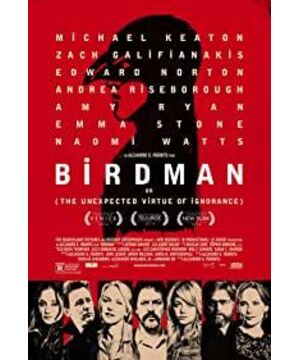Anti-movie: what are we talking about when we talk about movies
——Deconstruction of "Birdman"
——Introduction to Film Theater
Text/empty words
Movie is an absolutely impure art,
This is why it is the art of money.
-"Film as a Philosophical Experiment"
"Birdman" is a movie suitable for viewing as a commentary. It already contains criticism and counter-criticism about the movie. It deconstructs the things that can be talked about around the film: actors and screenwriters, audiences, literary critics; film culture, box office, film reviews... In the deconstruction of these participants and cultural phenomena, it shows their own self-righteousness and their own reality. The gap between the situation and its ideals. Through these deconstructions, it shows the self-knowledge of film culture and shows what actually happened around the film. This deconstruction is lingering black humor. If the comments on it fail to appreciate the black humor, then it is likely to see the emotional value similar to the chicken soup of the soul or the best-selling book-love or tolerance, etc.-viewers with positive energy will love it. Moreover, the film’s own narrative style is so ambiguous and ambiguous, which frees viewers who are inclined to derive opinions from it: viewers can even obtain some philosophical insights from the side. This is also a manifestation of the impure nature of movies.
【Plot: Play in the Play】
The film "Birdman" revolves around a certain outdated movie star who once starred in "Birdman", which is a fantasy superhero movie, prepares to write, direct and act in the drama "What are we talking about when we talk about love" The estrangement and entanglement between what he encountered and the phantom of the brilliant role he once played, between his actor colleagues, between his uncertain audience, between his critics of literature, and between his wife and daughter And it presents the swing between the secular taste and artistic pursuit of the film and the mental state of the film culture participants (mainly actors and audiences).
The play in the film "What are we talking about when we talk about love" is adapted from the short story of the same name. The plot of the short story is simple: Two middle-aged couples-Nicholas and Laura, Mel and Terri-discuss "what is love" when they drink at Mel's house party; Terri said that she had been with her before Mel住在一起的艾德非常爱她,爱到想杀死她,爱到揍她;梅尔试图掌控话语权,认为艾德对待特芮的态度里没爱情,让其他人认可他关于情感之爱Terri insists that there is love in Ed’s attitude towards her, and Ed also killed herself because of it; Meyer, in the case of difficult to persuade Terri, gives an example to show that because external factors are difficult to control, so love In fact, there is no guarantee of durability, and it is hard to be worthy of the name. The adapted version of the drama in the movie "Birdman" adds a plot of Ed's questioning of existence.
Although the topic of this short story is tender love, it actually expresses the indifferent atmosphere behind the words. Although the two couples participating in the discussion express their love for each other in words, their actions are dull and selfish. It presents a relativistic view of love, that is, love is not an absolute relationship, but a self-centered impulse and satisfaction, which is constructed relatively based on personal feelings. Similarly, "Birdman" centered on this plot to metaphor the situation of participants in film culture: actors, audiences, critics of literature and art, etc., all expressed themselves with their own center; the result is relatively independent of each other: the actors' Self-feelings, the audience's interest in the private lives of artists, the standards of literary critics, etc.; outside of their own existence is their own indifference: anti-actors, anti-audience, anti-literary critics, etc.
[Reverse actor: presence in disguise]
The film "Birdman" adopts the narrative method of play in play, which is often used to express the dialectics of reality and fiction. The essence of the actor is involved in the dialectics of reality and fiction. Just as a playwright said, "Disguise is the reality of actors, and the public who used to be their material and judges are also the objects of their fools. Because disguise is their reality, they can also regard reality as disguise." (William Maugham). In order to survive in the drama, the actor must conceal himself. This can be regarded as a law about actors, and the nature of actors can be deduced from this law.
"Birdman" shows the nature of the actor in many plots. The actor No. 2 had to drink real wine during a drama performance. When he discovered that the wine had been replaced with water, he ignored the drama being performed and started to make trouble. The reason is that he believes that acting should be acted according to the truth. He even shouted into the audience, "Stop staring at the phone screen to see the world, is there anyone who cares more about the truth than me?" At this time, he asked to be involved in the performance, taking the disguise as real. Actress No.1 said to Actor No.2, "Maybe you are Mr. Truth on stage, but in real life, you are a liar." The actor on the second confession, "I didn't pretend on the stage, but I pretend in other places." If this is not a deliberate lie, it means that as an actor, he has reversed disguise and reality. The result of this is that everything about the actor has become a disguise, otherwise, the actor's sense of existence will disappear.
On the stage or in the movie, the actor has to cancel the self and pretend to be the corresponding self according to the setting of the script or role. When actress number one cried, "Why do I have no self-esteem"; actress number two said, "Honey, you are an actor". The approximate meaning of this answer is that you don't have any self, so there is no self-esteem. The self-esteem of an actor is a realistic disguise. Just as Actor No. 2 asked Actor No. 1 to change the prop pistol to be more realistic. If you are used to disguise, your shame as a private person will be weakened. The performance of actor No. 2 and actress No. 2 can reflect this. Even actors cannot demand too much self-esteem in disguise, because whether the disguise is true or not should be judged by the public. Obtaining the admiration of the audience and the love of the audience are the same thing for an actor. Of course, for the entire film culture circle, this conclusion is only derived from the one-sided aspect of "actors-audience", and audiences actually don't have so many choices, because they are also fooled.
The glory of the role goes beyond the actor's self that should be cancelled. The presence of an actor must be maintained by the degree of popularity of the role. The actor loses the sense of presence when he leaves the role, and an unwelcome role can only bring a weak sense of presence. The actor No. 1 (leading actor)'s failure as an actor lies in his ignoring the laws that govern actors. As the leading actor, all his glory is borne by the "birdman" role he once played. When he is far away from the audience's interest, his sense of existence is gradually lost. This is exactly the question of the sense of existence that Ed, who is a role in the play, asked before committing suicide: If you are not loved, then where does the sense of existence start? ! This question is also asking about the presence of the actor as the number one actor, and the presence of the actor. This problem can only be solved by the enthusiasm of the audience, which is to give the actors a sense of existence by the love of the audience.
Actor One always ignores the interest of more audiences and the attitude of literary critics when rehearsing the script. He is just immersed in the self-righteous so-called artistic pursuit, which makes him fall into the whirlpool of actor-centrism and think it can be used. The identity of the actor dictates the art. If he continues to be immersed in the state of actor-centrism, then he will once again become the fallen Icarus. No one cares about his so-called artistic pursuit, and even literary critics do not care about the narrative structure or ideological theme of the drama he wants to perform. In fact, there is no pure artistic pursuit at all. Just as his daughter said, "Preparing for this stage play is not for art, but just to get myself back into the show business circle", that is, to regain the care of the audience, to gain a sense of existence, and to participate in the profit production of the film industry. But now is the age of the Internet. For actors to gain presence, they should extend the disguise of life to cyberspace, to virtual social networks, and to media topics that gather audiences’ interests. Judging from the words of the actor's No. 1 daughter, it is not so much that he does not understand the meaning of disguise for the actor, it is better to say that he has not adapted to the new environment and is confused by the actor's paranoia. Until literary critics ruthlessly ignored his efforts, it was difficult for him to gain recognition. He still comforted himself with the once-successful disguise. In the dislocation of disguise and reality, and in the "ignorance" of this dislocation, he aroused the audience's feelings. Enthusiasm, got an unexpected sense of presence.
"Birdman" is not a hymn to the actor, but just shows the absurdity of the actor's identity. The actor has forgotten the reality he pleases in the sense of existence gained by disguise, thinking that he can have noble pursuits. Icarus just used camouflaged wings to escape the predicament, but he thought he had natural wings, and fell in the air ignoring the changes in the environment. Just as what "Sunset Boulevard" (a film released in 1950) shows is not how silent actors are more artistic than voice film actors, but shows actors so self-righteous and so confused while ignoring changes in the environment. In this regard, "Birdman" reproduces the theme of the past. The protagonist similar to "Birdman" actually played the "Birdman" movie, and the protagonist in "Sunset Boulevard" was originally a famous actor from the silent film era. They all involve the reality of the actors, and for the film, the reality only adds to the fun of disguise.
[Anti-audience: Fantasy and Peeping Emotional Animals]
In the film "Birdman", when a male reporter asked the protagonist about the significance of the protagonist in writing a play with Roland Barthes' words about the change in popular culture, the female reporter next to him was bored and turned away from the topic. Ask questions about the protagonist’s private life. The male protagonist’s question represents the interest of a small number of intellectuals, while the female reporter’s question represents the interest of the majority of the audience. Most of the audience’s interest is not how high the artistic value of the role or the film can be. For the audience, the film is a fantasy and peeping presented through the effects of visual technology. The meaning of the actor to the audience is also to satisfy the fantasy and peep. The audience's self-centered interest makes them try to satisfy the need of seeing in the emotional meaning through the fantasy and peeping brought by movies and actors.
Group hints are controlling the audience's mainstream tastes. Most of the audience didn’t care about the drama prepared by the lead actor of "Birdman". What they cared about was the actor who almost streaked through Times Square, the actor who blasted his nose off the stage with a real gun. In short, the audience even more. Care about the actor who can be used as a chat resource. Movie advertisements and entertainment rumors are also helping the audience to satisfy their curiosity and desire for peeping; the audience's many comments on the film have nothing to do with the plot, but just gossip about the actors. The audience's attention to the actors' lives outside the theater is always peeping, and the actors are distant and familiar to the audience. The term "star" is transformed from the private life of actors. It has nothing to do with art. It is an interest in private life specimens inspired by disguise.
The audience can be fooled. "Every minute there are idiots... Even in the face of bad movies, there will be people lining up to buy tickets to watch", actor No.2 said. According to this statement, the audience does not go to the movies for the sake of art. The audience chooses the movie to watch according to the movie promotion and the theater schedule, but before watching the movie, they have no effective basis for judging the quality of the movie. In fact, for most audiences, the probability of a bad film appearing is very small, because the audience as emotional animals seeks to consume the film for the purpose of feeding their senses. Movie advertisements often describe certain movies as "visual feasts", and movies are indeed very similar to food. Food is necessary to distinguish between good and bad in comparison, and the pros and cons of movies are only meaningful when they are comparable and selectable. "No movie has a bad ending. People are immersed in the happiness predicted by the timetable" (Jean Epstein, language). If the audience expects nothing more.
"Birdman"'s satire on the tastes of movie audiences is connected with the satire on superhero movies. The popularity and high box office of superhero movies shows the taste of the audience. Movie audiences "like big scenes, noise, and fast-paced; they like bloody and action scenes; they don't like talkative, depressing, and philosophical nonsense." The audience does not watch the movie for thinking, but to relieve the depression of life. The film brings satisfaction to the audience, "saving the audience from a boring and miserable life". Probably, for most viewers, even junk movies may be more interesting than their lives.
[Counter critics: redundant bystanders]
"A person can only become a critic when he cannot become an artist, just like a whistleblower who cannot become a soldier", "Birdman" satirizes the critics with this sentence. If literary critics and artists are on the same front, and the former shows sympathy and support for the latter, then artists will certainly not satirize critics in that way. The problem is that when literary and art technologists are creating, literary and art critics are likely to ignore the creation of literary and art technologists and blame them as worthless things. On the other hand, although literary critics also belong to the audience, they may not judge according to the audience's perception. It seems that the more literary critics adhere to a certain literary concept, the more they alienate the feeling of ordinary audiences.
Reasonable critics of literature and art do not fully sympathize with the actors or the audience. Therefore, it can be said that literary critics are the third party in the actor-audience relationship, and for the film, they are even completely redundant bystanders.
Actors can say like the protagonist of "Birdman" that the critics who made malicious criticism just tried to deny the script and performance with derogatory labels, but ignored the labor and cost they paid, and the critics did not spend much cost. . In this regard, the literary critics in the film sneered softly. Bad movies are bad movies. As long as the literary works do not reach the level of literary ideals, then no amount of cost will be able to change the facts. Although the relative indifference of critics sometimes seems very unhuman, the judgment based solely on human feelings is also absurd.
For some movie audiences, it is unreasonable for literary critics to criticize films according to their own literary concepts. They do not comment on the "film standpoint". No matter how bad a movie is, someone will watch it if necessary. Just like the relativism of the concept of love implied by "what are we talking about when we talk about love", the audience's evaluation of movies is also relativistic. The relationship between Ed and Terri can be used as a metaphor for the relationship between the actor (film) and the audience. At this time, Mel is a critic, and he adheres to certain absolute standards. 艾德一边说着“我爱你”,一边揍着特芮,而特芮却认为艾德对待她的态度是爱情的。Even though Mel thinks that the relationship between Ed and Terri is not love at all, or a terrible love, Terri insists on his feelings. In the end, Mel failed to change Terri's view. Correspondingly, even if certain movies are considered bad by literary critics, or even abuse the audience, there will always be audiences who think it is a movie to watch. Literary critics use certain absolute artistic standards to measure movies, but this is often ineffective for the audience. Since the audience’s perception of the movie is centered on each other, the film reviews made by the calm critics have become insignificant by the spectator.
Movies are not for literary critics, just as real film reviews are not written for loyal audiences. Film reviews are either unreadable to the audience, or they are writing content that has nothing to do with the sense-satisfying movies that the audience sees. When the film reviews become lace news that the audience finds interesting, it is no longer a film review. Watching movies is a place for audiences to participate in democratically. Their sensory satisfaction is the only legal comment. Literary and art critics should wander in the wilderness outside this place.
[Anti-art: Film as a cultural waste processor]
"Film is a kind of cultural extinction", "Birdman" presents this point of view through the comparison of film and drama, which of course is viewed from the standpoint of drama as the center. Stage plays or plays show the struggle between a purer soul and complex emotions; while movies are mixed with too much acrobatic fun. Movies and dramas are actually influenced by secular tastes and artistic pursuits, while dramas or stage plays are probably considered to be more art than movies. It can even be said that most movies have nothing to do with art at all.
The popularity of superhero movies serves as a clear illustration of the non-artistic nature of movies. They generally lack the revelation of deep-seated human contradictions, and instead use various spectacles and disaster scenes to satisfy the audience's demand for fantasy. Superhero movies have succeeded in business and won high box office, but non-art is still non-art. The box office is almost also anti-art, and the high box office is almost only pieced together by audiences who lack the ability to appreciate art.
However, "Birdman"'s satire on the film as an anti-art is not for expressing the truth, but for entertainment. Although movies are not pure art, dramas are not so pure, and superhero movies are not so unrelated to art.
The things that exist around the film are deconstructed, which only reveals the limitations of the film in the culture, and clarifies the subtext of the reality of the film. As a result, the actors, audiences, and literary critics each appear to be different from what they should be. The difference, or even the opposite. From this, we can see the anti-actors, anti-audience, anti-literary critics, anti-pop art... However, these attitudes are not intended to change anything, but only show what the wise have already known. State, although it is in the form of irony, irony never really changes anything. The ironic effect of deconstructing movies is that when people see the hypocrisy surrounding the film—the hypocrisy of the actors, the hypocrisy of the director, the hypocrisy of the audience, the hypocrisy of literary critics, and the hypocrisy of popular art—will not be intolerable. Movies are originally art of hypocrisy.
View more about Birdman or (The Unexpected Virtue of Ignorance) reviews











